Best Indonesian Coffee Brand: Discover the Rich and Bold Flavours of the Archipelago
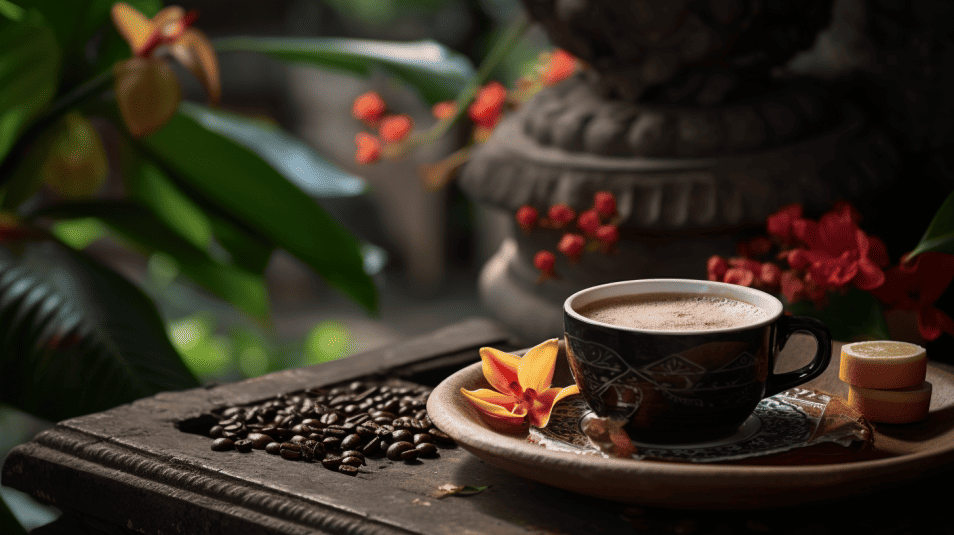
If you’re a coffee lover, you’ve probably heard of Indonesian coffee. Indonesia is the fourth-largest coffee producer in the world, and its coffee is known for its unique flavour profiles and characteristics. With so many varieties and brands to choose from, it can be challenging to find the best Indonesian coffee brand that suits your taste.
In this article, we’ll take a closer look at some of the top Indonesian coffee brands, including their history, unique flavour profiles, and production methods.
We’ll also explore the challenges facing the Indonesian coffee industry and the efforts being made towards sustainability and fair trade. Whether you prefer a bold and earthy Sumatran coffee or a smooth and sweet Balinese blend, we’ve got you covered.
Key Takeaways
- Indonesian coffee is known for its unique flavour profiles and characteristics.
- There are many varieties and brands of Indonesian coffee to choose from.
- The Indonesian coffee industry faces challenges, but efforts are being made towards sustainability and fair trade.
History of Indonesian Coffee
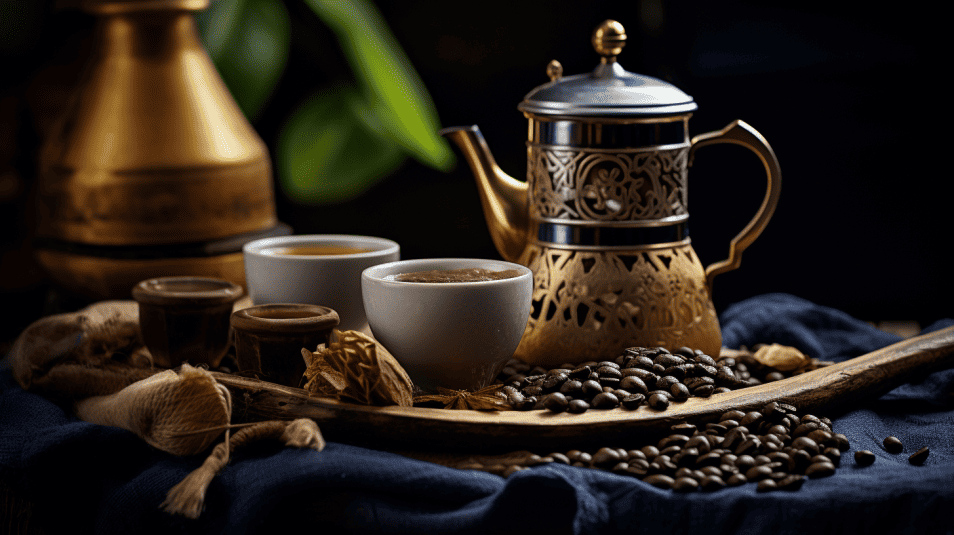
You’re in for a treat if you’re a coffee lover, especially if you’re interested in the history of coffee. Indonesia has a long and fascinating history when it comes to coffee. The country’s coffee history dates back to the 17th century, when it was first introduced to the country by Dutch traders.
During the Dutch colonial period, Indonesia became one of the world’s leading coffee producers, and it’s still a major player in the coffee industry today. The Dutch were particularly interested in cultivating coffee in their colonies to break the Arab monopoly on coffee trade and establish their own supply.
The first coffee plants were brought to Indonesia from Yemen, which was a major coffee producer at the time. The Dutch began cultivating coffee on the island of Java in the early 1700s, and by the end of the century, Java had become one of the world’s leading coffee producers.
As coffee production expanded, the Dutch began to introduce other varieties of coffee plants to Indonesia, including the Typica and Bourbon varieties. These new varieties helped to diversify the country’s coffee production and led to the development of unique Indonesian coffee blends.
Today, Indonesia is home to numerous coffee-growing islands, including Java, Sumatra, Sulawesi, and Bali, each with its own unique coffee culture and history. Indonesian coffee is known for its bold, complex flavours and unique processing methods, such as the famous Kopi Luwak, which is made from coffee beans that have been eaten and excreted by civet cats.
In conclusion, Indonesia’s coffee history is rich and fascinating, and it has played an important role in the growth of the country. The country’s unique coffee blends and processing methods have made Indonesian coffee a favourite among coffee lovers around the world.
Coffee Growing Regions in Indonesia
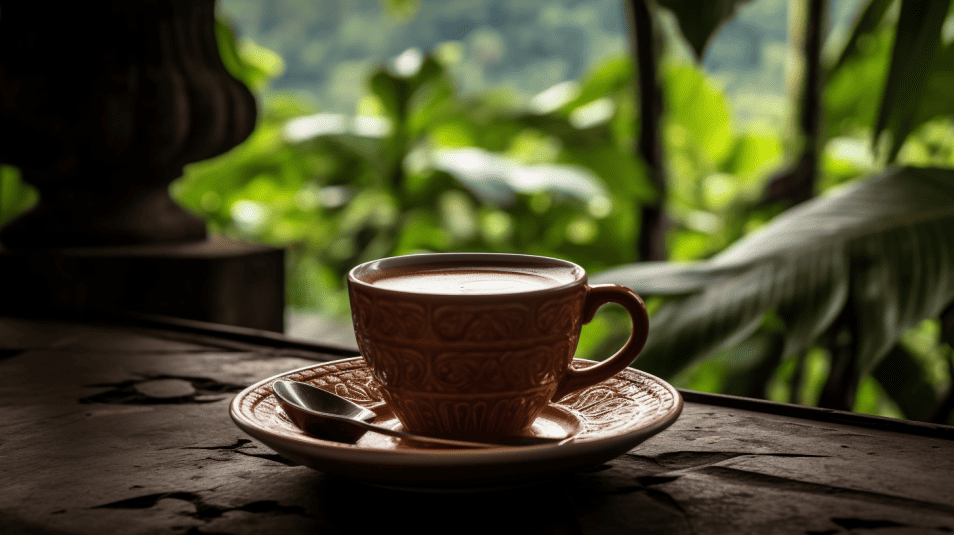
Indonesia is known for its diverse range of coffee beans that are grown in different regions across the country. Each region has its unique climate, soil, and altitude, contributing to the distinct flavour profiles of Indonesian coffee.
Here are the major coffee growing regions in Indonesia:
Sumatra
Sumatra is one of the largest coffee growing regions in Indonesia, known for its bold and earthy coffee beans. The coffee beans grown in Sumatra are typically processed using the wet-hulled method, which gives them a distinct flavour profile. The region produces both Arabica and Robusta coffee beans, with Mandheling and Gayo being the most popular varieties.
Java
Java is another prominent coffee growing region in Indonesia, known for its smooth and rich coffee beans. The coffee beans grown in Java are typically wet-processed, which gives them a clean and bright flavour profile. The region produces both Arabica and Robusta coffee beans, with Java being the most popular variety.
Bali
Bali is a small but significant coffee growing region in Indonesia, known for its sweet and fruity coffee beans. The coffee beans grown in Bali are typically wet-processed, which gives them a mild and balanced flavour profile. The region produces both Arabica and Robusta coffee beans, with Kintamani being the most popular variety.
Sulawesi
Sulawesi is a mountainous region in Indonesia known for its complex and spicy coffee beans. The coffee beans grown in Sulawesi are typically wet-processed, which gives them a bold and full-bodied flavour profile. The region produces both Arabica and Robusta coffee beans, with Toraja being the most popular variety.
Timor
Timor is a small island in Indonesia known for its smooth and mild coffee beans. The coffee beans grown in Timor are typically wet-processed, which gives them a clean and bright flavour profile. The region produces both Arabica and Robusta coffee beans, with Timor being the most popular variety.
Flores
Flores is a small island in Indonesia known for its sweet and fruity coffee beans. The coffee beans grown in Flores are typically wet-processed, which gives them a mild and balanced flavour profile. The region produces both Arabica and Robusta coffee beans, with Bajawa being the most popular variety.
Papua
Papua is a large island in Indonesia known for its complex and fruity coffee beans. The coffee beans grown in Papua are typically wet-processed, which gives them a bold and full-bodied flavour profile. The region produces both Arabica and Robusta coffee beans, with Wamena being the most popular variety.
Indonesia’s coffee growing regions are unique and diverse, each contributing to the country’s rich coffee culture. From the mountainous areas to the islands, Indonesia’s coffee beans are truly a reflection of the country’s diverse landscape and climate.
Coffee Varieties and Characteristics
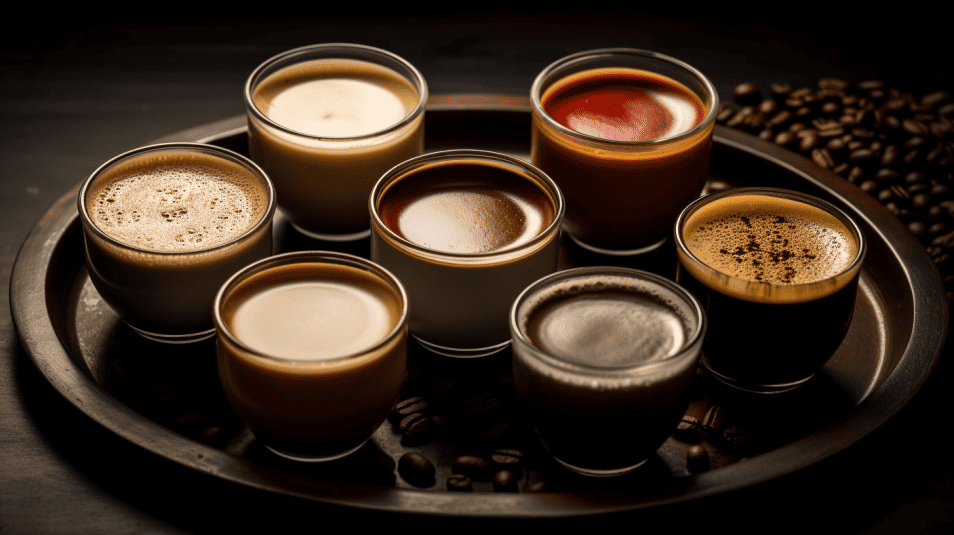
When it comes to Indonesian coffee, there are two main varieties: Arabica and Robusta. Both varieties have unique characteristics that make them stand out.
Arabica
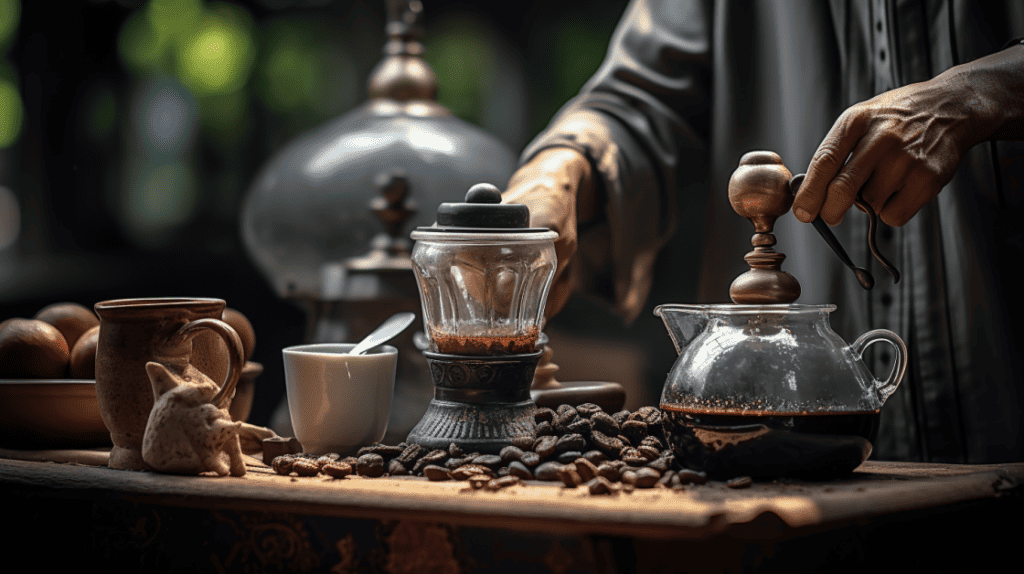
Arabica coffee is often considered to be the superior variety due to its complex flavour profile and lower caffeine content. It is grown at high altitudes and requires a specific climate to thrive. Arabica beans are known for their fruity, floral, and acidic notes, and can have a range of flavours such as chocolate, caramel, and nutty undertones.
Indonesia is known for producing some of the world’s best Arabica coffee beans. The country’s unique geography and climate create ideal growing conditions for the plant. Arabica coffee is grown in regions such as Bali, Sumatra, Sulawesi, Java, Timor, and Papua.
Robusta
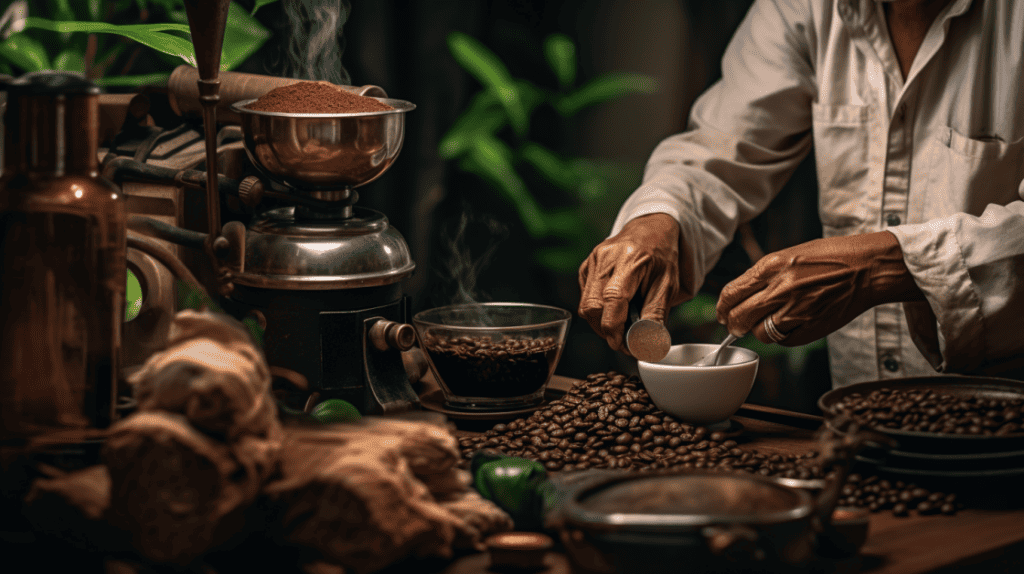
Robusta coffee is known for its strong and bold flavour profile, with higher caffeine content than Arabica. It is grown at lower altitudes and is more resistant to disease and pests than Arabica. Robusta beans have a woody, earthy, and bitter taste, with notes of chocolate, nuts, and spices.
Indonesia is also known for producing high-quality Robusta coffee beans. The country’s Robusta beans are grown in regions such as Sumatra, Java, and Sulawesi.
In conclusion, both Arabica and Robusta varieties have their unique characteristics and flavour profiles. Whether you prefer a fruity and acidic cup of Arabica or a bold and strong cup of Robusta, Indonesian coffee has something to offer for every coffee lover.
Coffee Processing Methods
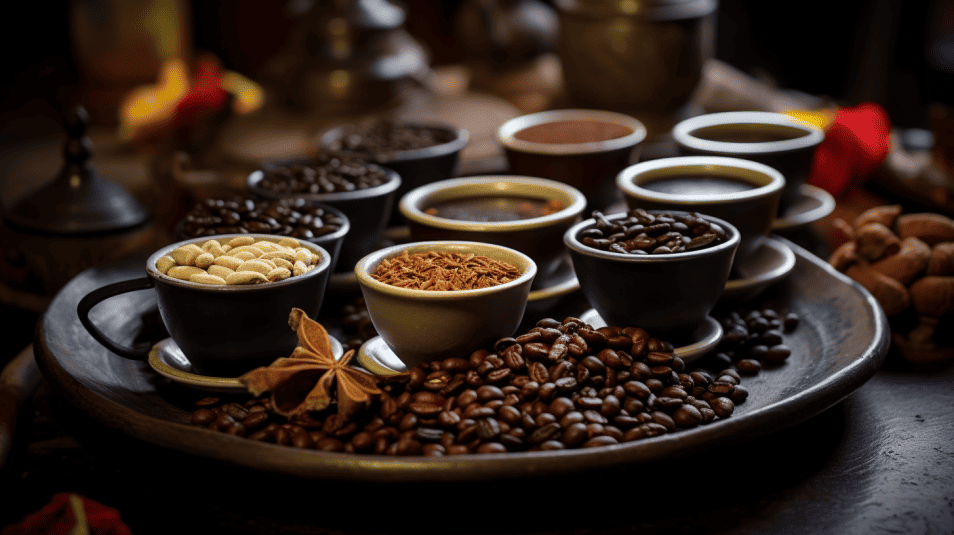
Indonesia is known for its unique coffee processing methods that contribute to the distinct flavour profiles of its coffee beans. There are two main coffee processing methods used in Indonesia: wet processing and dry processing.
Wet processing is also known as washed processing and involves removing the outer skin of the coffee cherry before fermenting and washing the beans to remove the remaining pulp. This method results in a cleaner, brighter flavour profile and is commonly used for specialty coffees such as Toraja coffee and Aceh coffee.
Dry processing involves drying the whole coffee cherry in the sun before removing the outer skin and pulp. This method is commonly used for Robusta coffee and results in a heavier, earthier flavour profile.
One unique processing method used in Indonesia is wet hulling, also known as giling basah. This method involves removing the outer skin and pulp before drying the beans to a moisture content of around 30%. The beans are then hulled, removing the parchment layer, before being dried further. This method is commonly used for Arabica coffee and results in a full-bodied, low-acid flavour profile.
Another unique processing method used in Indonesia is the production of kopi luwak coffee. This involves feeding coffee cherries to the Asian palm civet, a cat-like mammal, before collecting and cleaning the beans from their faeces. This method results in a unique, smooth flavour profile with low acidity.
Overall, Indonesia’s unique coffee processing methods contribute to the diverse and complex flavour profiles of its coffee beans. Whether you prefer a bright and clean flavour or a full-bodied, earthy flavour, there is an Indonesian coffee to suit your taste.
Unique Flavour Profiles
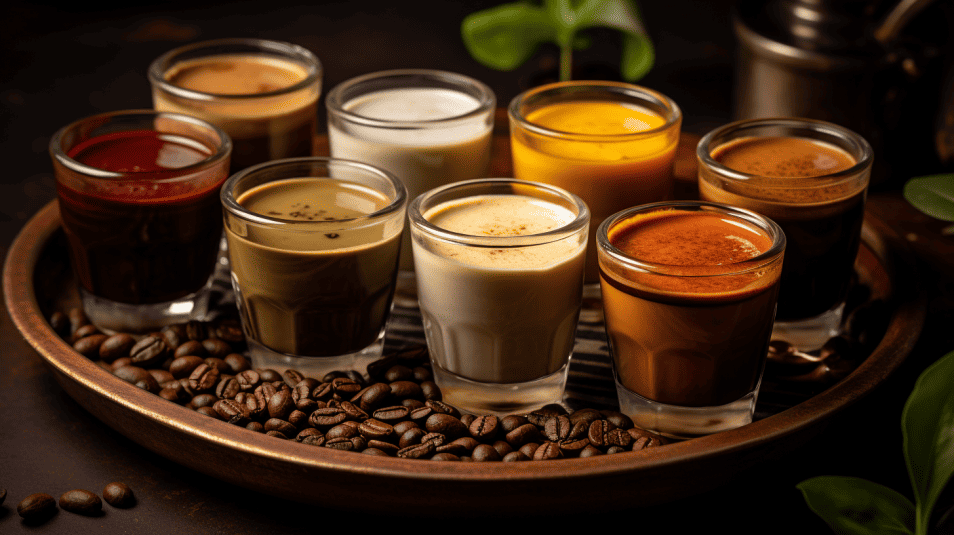
When it comes to Indonesian coffee, you can expect a unique and exciting flavour profile that sets it apart from other coffee varieties. The flavour profiles of Indonesian coffee can vary depending on the region, but some of the most common flavour notes include earthy, spicy, dark chocolate or cocoa, woody, and tobacco.
Indonesian coffee is known for its low acidity, which makes it an excellent choice for those who prefer a smoother and less acidic cup of coffee. The earthy flavour of Indonesian coffee is also a standout feature, with many coffee lovers describing it as reminiscent of the rich soil where the coffee beans are grown.
If you’re a fan of spicy coffee, then Indonesian coffee is definitely worth trying. Some varieties of Indonesian coffee have a spicy kick that can add a bit of heat to your morning cup. On the other hand, if you prefer a milder flavour, there are also Indonesian coffees that have a smooth and full-bodied taste.
One of the most unique flavour profiles of Indonesian coffee is its woody and smoky flavour notes. This flavour profile is often associated with Sumatran coffee, which is known for its rich and complex taste. The smoky flavour is a result of the unique processing method used to produce Sumatran coffee, which involves drying the beans over an open fire.
In summary, Indonesian coffee offers a wide range of flavour profiles that are sure to excite any coffee lover. Whether you prefer a low acidity, earthy, spicy, smooth, full-bodied, woody, or smoky flavour, there is an Indonesian coffee variety that will suit your taste buds.
Popular Indonesian Coffee Brands
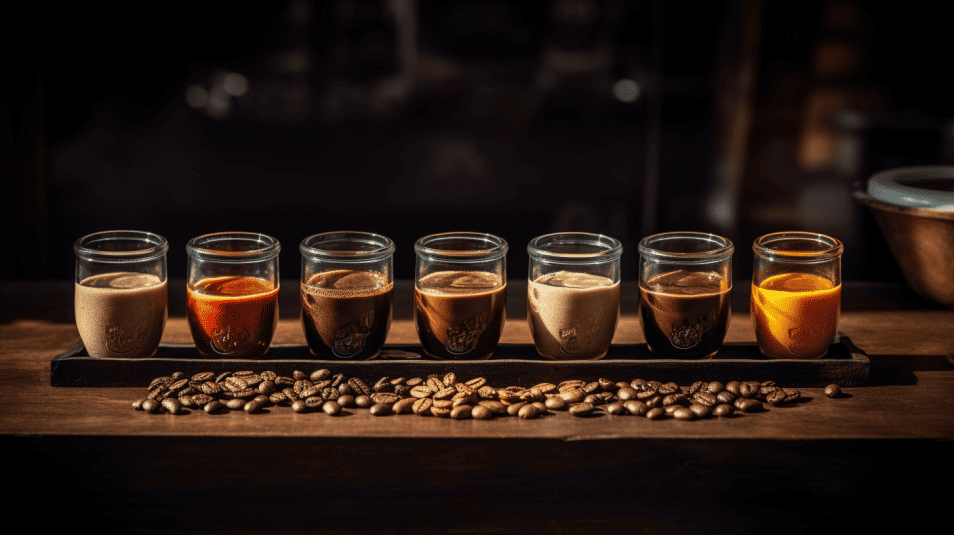
If you are a coffee lover, you must have heard about the famous Indonesian coffee brands.
Here are some of the popular Indonesian coffee brands that you should try.
Sumatra Mandheling
Sumatra Mandheling is one of the most famous Indonesian coffee brands. It is grown in the Aceh province of Sumatra and is known for its bold and earthy flavour. The coffee beans are roasted to a dark colour, which gives it a unique taste. Sumatra Mandheling is also known for its low acidity, making it perfect for those who prefer a less bitter taste.
Java Taman Dadar
Java Taman Dadar is another popular Indonesian coffee brand. It is grown on the island of Java and is known for its rich and full-bodied flavour. The coffee beans are roasted to a medium-dark colour, which gives it a smooth taste. Java Taman Dadar is also known for its low acidity, making it perfect for those who prefer a less bitter taste.
Sumatra Gayo
Sumatra Gayo is a coffee brand that is grown in the Gayo highlands of Sumatra. It is known for its fruity and floral flavour, which is a result of the unique growing conditions of the region. The coffee beans are roasted to a medium-dark colour, which gives it a smooth taste. Sumatra Gayo is also known for its low acidity, making it perfect for those who prefer a less bitter taste.
Bali Blue Moon
Bali Blue Moon is a coffee brand that is grown in the Kintamani Highlands of Bali. It is known for its sweet and spicy flavour, which is a result of the unique growing conditions of the region. The coffee beans are roasted to a medium-dark colour, which gives it a smooth taste. Bali Blue Moon is also known for its low acidity, making it perfect for those who prefer a less bitter taste.
Sulawesi Toraja
Sulawesi Toraja is a coffee brand that is grown in the Sulawesi region of Indonesia. It is known for its complex and rich flavour, which is a result of the unique growing conditions of the region. The coffee beans are roasted to a medium-dark colour, which gives it a smooth taste. Sulawesi Toraja is also known for its low acidity, making it perfect for those who prefer a less bitter taste.
Sulawesi Kalossi
Sulawesi Kalossi is another coffee brand that is grown in the Sulawesi region of Indonesia. It is known for its spicy and earthy flavour, which is a result of the unique growing conditions of the region. The coffee beans are roasted to a medium-dark colour, which gives it a smooth taste. Sulawesi Kalossi is also known for its low acidity, making it perfect for those who prefer a less bitter taste.
Java Planet
Java Planet is a coffee brand that is grown on the island of Java. It is known for its organic and fair trade coffee beans, which are roasted to a medium-dark colour, giving it a smooth taste. Java Planet is also known for its low acidity, making it perfect for those who prefer a less bitter taste.
In conclusion, these are some of the popular Indonesian coffee brands that you should definitely try. Each brand has its own unique flavour profile, so you can choose the one that suits your taste the most.
Coffee Production and Export
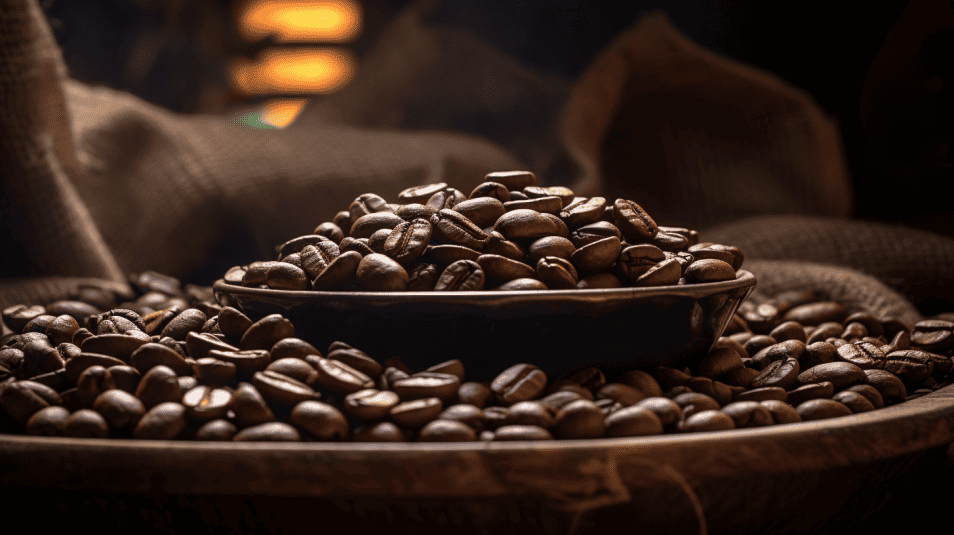
You are in for a treat when it comes to Indonesian coffee production and export. Indonesia is included in the top five largest coffee producing countries in the world. The country has many coffee-producing islands, such as Sumatra, Java, Sulawesi, and Bali, each with its unique coffee varieties. Because of its location and climate near the equator, Indonesia is an ideal place to host coffee plantations.
Indonesia’s coffee production is dominated by small-scale farmers who cultivate coffee on small plots of land. The coffee grown in Indonesia is known for its unique flavour profile, which is a result of the country’s diverse geography, soil types, and climate. The most popular coffee varieties in Indonesia are Arabica and Robusta.
Indonesia’s coffee yield varies from year to year, depending on the weather and other factors. However, the country’s coffee production has been steadily increasing over the years, with the Central Statistics Agency (BPS) noting that in 2020, the value of Indonesian coffee exports reached US$ 809.2 million.
Indonesian coffee producers and exporters, such as Niagacoffee and Indocoffee, offer a wide range of coffee products, from green coffee beans to roasted and ground coffee. These companies are committed to providing high-quality coffee products and excellent customer service. With ready stock for crop year 2023, you can be assured of the freshness of the coffee you receive.
Overall, Indonesia’s coffee production and export industry is thriving, thanks to the dedication and hard work of the country’s coffee farmers and producers. You can enjoy the unique and delicious taste of Indonesian coffee by trying out some of the country’s best coffee brands.
Sustainability and Fair Trade
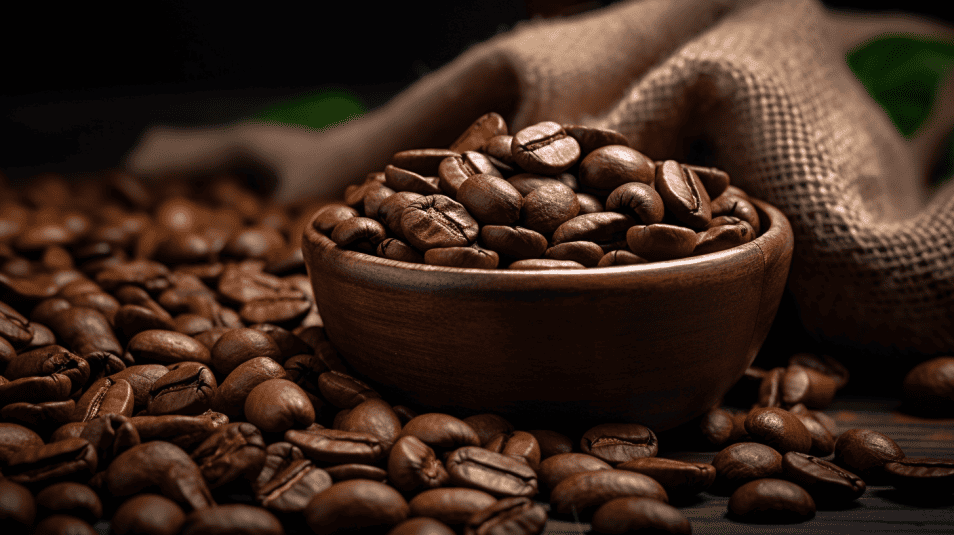
You care about the environment and the people who grow your coffee. That’s why you want to choose a brand that is committed to sustainability and fair trade practices. Luckily, there are many Indonesian coffee brands that fit the bill.
One way to ensure that your coffee is sustainably produced is to look for organic certifications. Java Planet Colombian Organic Coffee is a great example of a brand that is committed to organic farming practices. Their coffee is grown without the use of harmful chemicals, which is better for the environment and for the people who work on the farms.
Fair trade is another important consideration when choosing a coffee brand. Fair trade ensures that farmers are paid a fair price for their crops, which helps to support their families and communities. Barriehousestore’s Indonesian Sumatra Fair Trade Organic Coffee is a great option if you want to support fair trade practices.
Nespresso has also launched a permanent range of certified coffee called ‘Master Origin Indonesia’, which is mastered by craftsmen and inspired by the land. This range is a testament to Nespresso’s commitment to sustainability and fair trade practices.
It’s important to note that not all sustainable and fair trade coffee brands are certified. Some smaller brands may not have the resources to obtain certifications, but still operate with sustainable and fair trade practices. So, be sure to do your research and look for brands that are transparent about their practices.
In summary, choosing a sustainable and fair trade coffee brand is a great way to support the environment and the people who grow your coffee. Look for organic certifications and fair trade practices when choosing your next cup of Indonesian coffee.
Challenges in Indonesian Coffee Industry
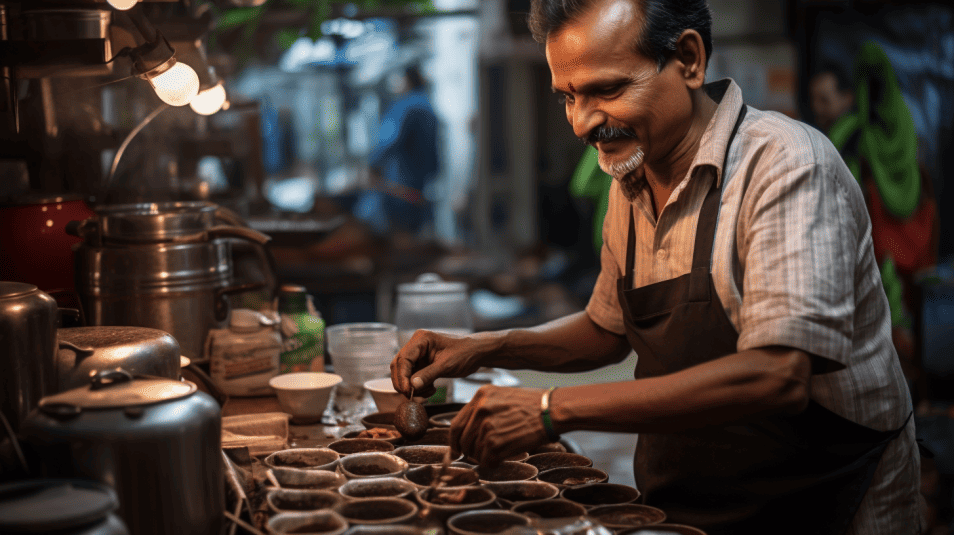
Despite its rich coffee heritage, the Indonesian coffee industry faces various challenges that affect its growth and profitability.
Here are some of the most pressing challenges:
Coffee Leaf Rust

Coffee leaf rust, also known as Hemileia vastatrix, is a fungal disease that affects coffee plants. The disease causes the leaves to fall off, reducing the plant’s ability to produce coffee beans. This disease has affected Indonesian coffee production, leading to low yields and poor quality coffee beans.
The government and coffee farmers in Indonesia are working together to combat the disease by using resistant coffee varieties and implementing better farming practices.
Coffee Rust
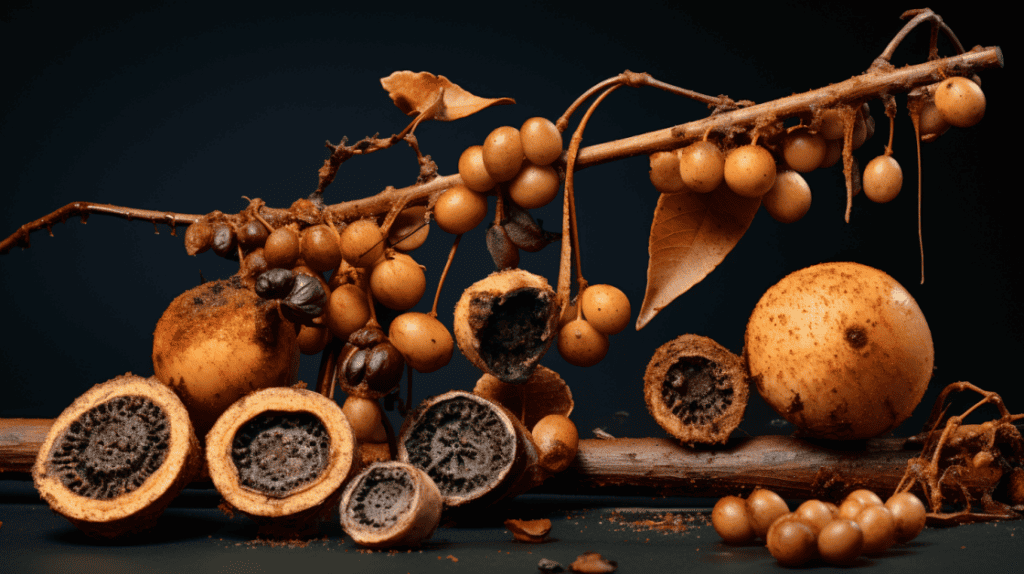
Coffee rust is another fungal disease that affects coffee plants. It causes premature leaf drop and reduces the plant’s ability to produce coffee beans. The disease has affected coffee production in Indonesia, leading to low yields and poor quality coffee beans. The government and coffee farmers in Indonesia are working together to combat the disease by using resistant coffee varieties and implementing better farming practices.
Climate Change
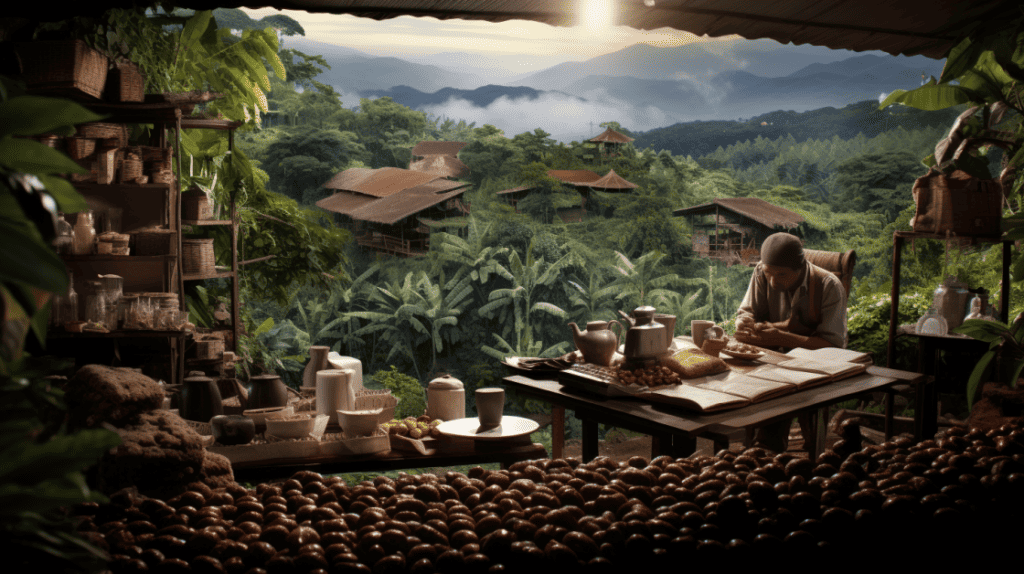
Climate change is affecting coffee production in Indonesia. Changes in temperature and rainfall patterns have led to unpredictable harvests and lower yields. Coffee farmers are struggling to adapt to these changes, and many are facing financial difficulties. The government and coffee farmers are working together to implement better farming practices and develop new coffee varieties that are more resistant to climate change.
Lack of Infrastructure
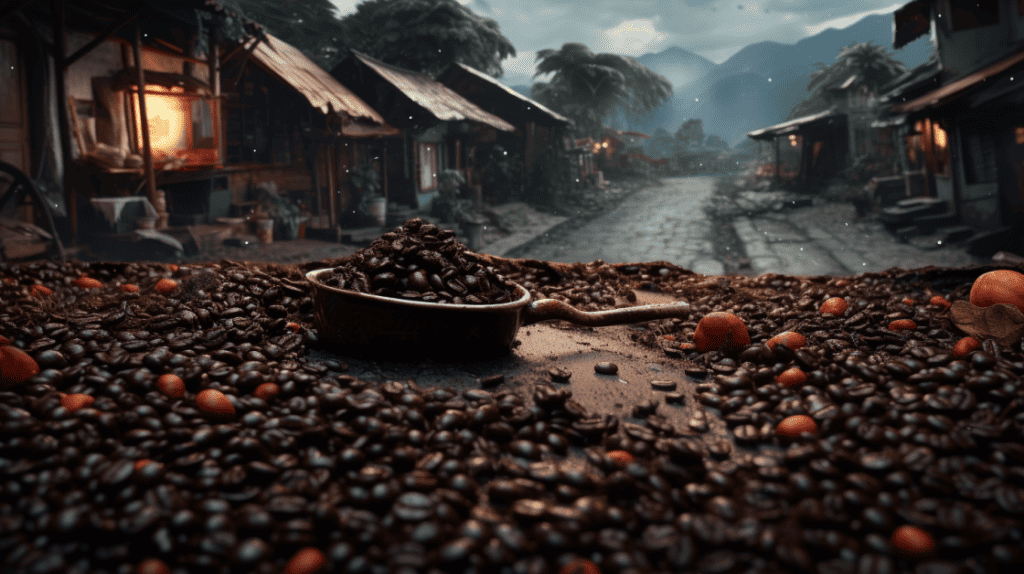
The lack of infrastructure in Indonesia is another challenge facing the coffee industry. Poor roads and transportation systems make it difficult for coffee farmers to transport their coffee beans to market. This results in higher transportation costs and lower profits for coffee farmers. The government is working to improve infrastructure in rural areas, but progress has been slow.
Lack of Access to Capital
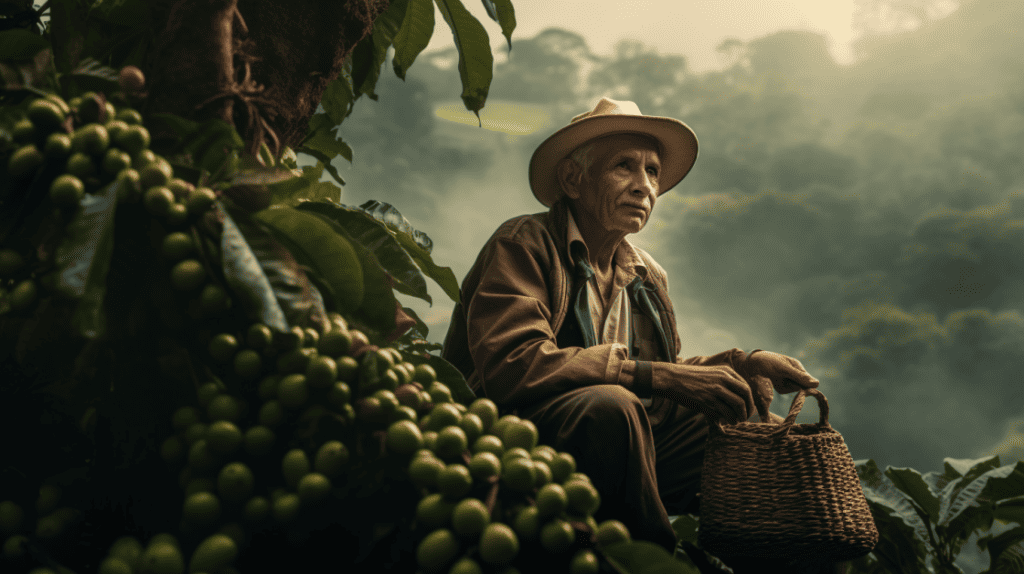
Many coffee farmers in Indonesia struggle to access capital to invest in their farms. This limits their ability to adopt new farming practices, improve their equipment, and invest in new coffee varieties. The government and non-governmental organizations are working to provide more access to capital for coffee farmers in Indonesia.
In conclusion, the Indonesian coffee industry faces various challenges that affect its growth and profitability. However, the government and coffee farmers are working together to combat these challenges and improve the industry.
Brewing Indonesian Coffee
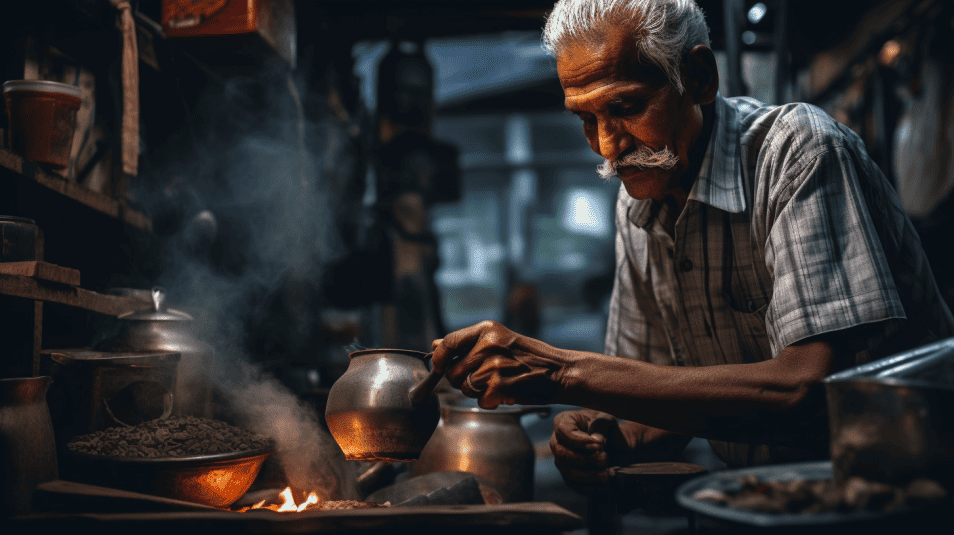
You’ve got your hands on some delicious Indonesian coffee beans, and now it’s time to brew them up and experience the rich flavours and aromas.
Here are some tips for brewing the perfect cup of Indonesian coffee.
Coffee Brewing
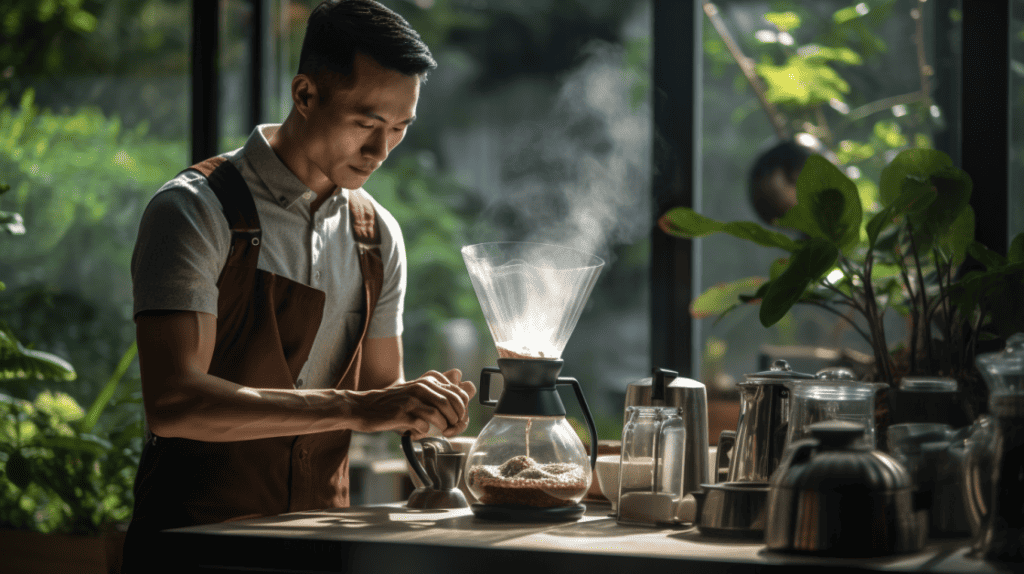
The best way to brew Indonesian coffee is by using a French press or a drip coffee maker. These methods allow the full flavour of the coffee to be extracted, resulting in a rich and satisfying cup.
Fresh Roasted Coffee
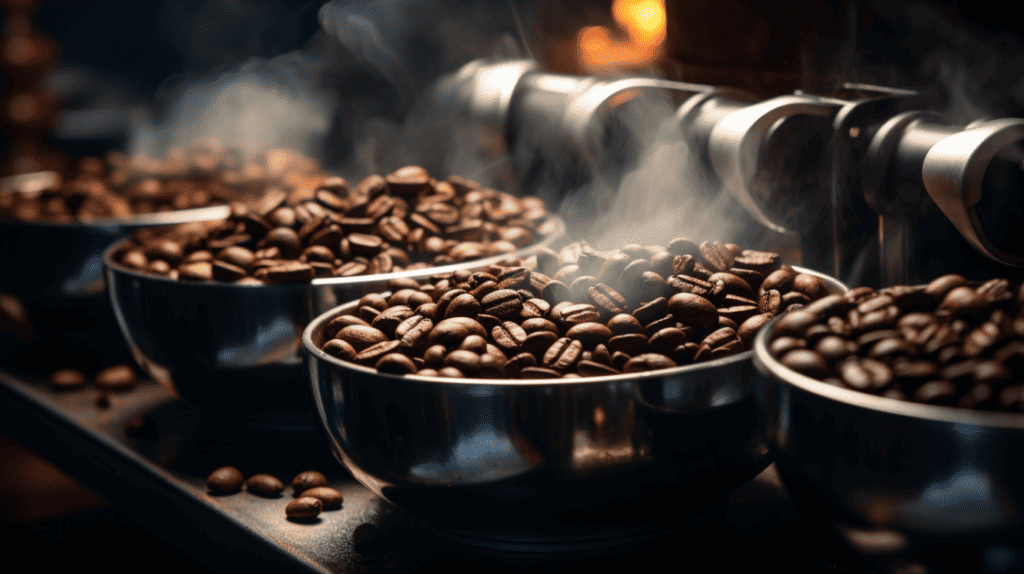
It’s important to use fresh roasted coffee beans when brewing Indonesian coffee. Look for beans that have been roasted within the past two weeks, as the flavour and aroma will be at their peak during this time.
Freshness
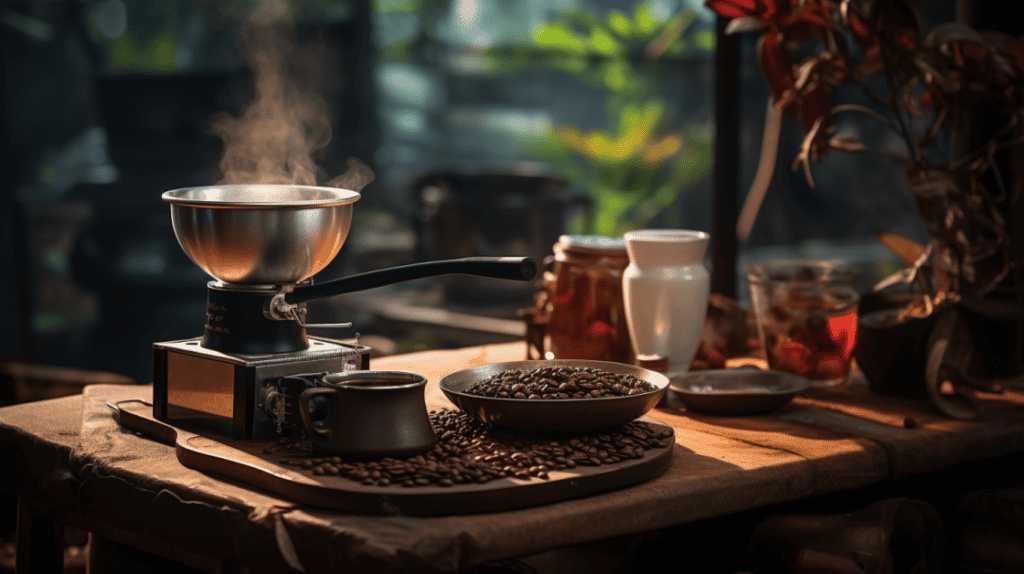
To ensure the freshest possible cup of coffee, grind your beans just before brewing. This will allow the full flavour and aroma to be released during the brewing process.
Caffeine Content
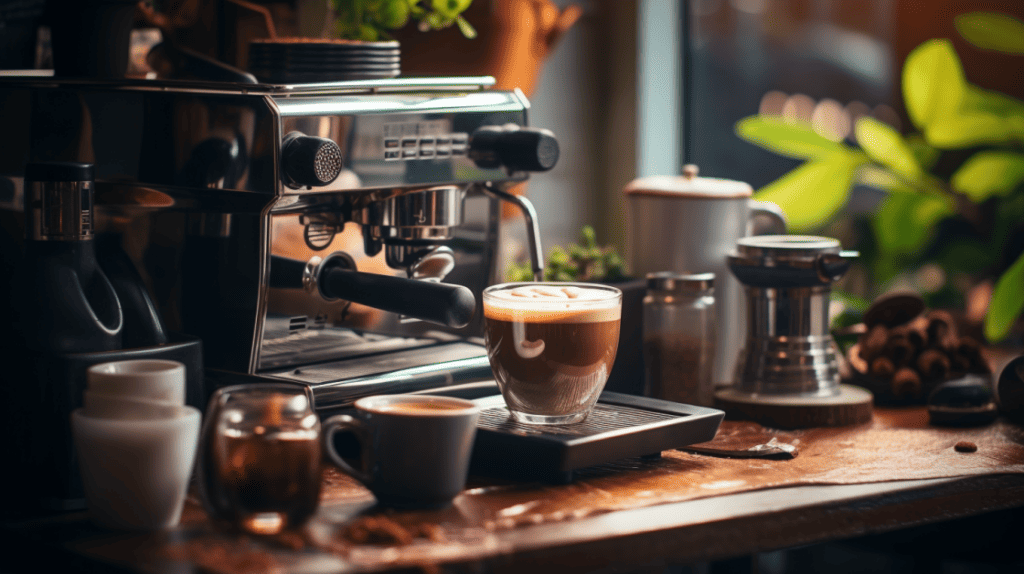
Indonesian coffee typically has a moderate caffeine content, making it a great choice for those who want a pick-me-up without the jitters. However, if you’re looking for a stronger cup, consider using a darker roast or brewing with a higher coffee-to-water ratio.
So there you have it, some tips for brewing the perfect cup of Indonesian coffee. Experiment with different brewing methods and ratios until you find the perfect cup for you. Enjoy!
Frequently Asked Questions
What are some of the best Indonesian coffee brands?
Indonesia is home to some of the best coffee in the world. Some of the most popular Indonesian coffee brands are Mandailing Estate, Toraja Sulawesi, and Gayo. These brands are known for their unique flavour profiles and high-quality beans.
Which Indonesian coffee brand is known for its quality?
Kopi Luwak is considered to be the most expensive and high-quality Indonesian coffee brand. It is made from coffee beans that have been eaten and excreted by the Asian palm civet. The beans are then collected and processed to produce a unique and highly sought-after coffee.
What makes Indonesian coffee beans unique?
Indonesian coffee beans are known for their earthy, spicy, and herbal flavour profiles. This is due to the unique growing conditions in Indonesia, which include volcanic soil, high altitude, and a humid climate. Additionally, Indonesian coffee is often processed using the wet-hulled method, which gives the beans a distinct flavour and aroma.
Can you recommend a delicious Indonesian coffee recipe?
If you’re looking for a delicious Indonesian coffee recipe, try making a traditional Kopi Tubruk. To make this coffee, simply boil water and add coarsely ground coffee to a cup. Stir and let the coffee steep for a few minutes before enjoying.
What are some popular Indonesian coffee drinks?
Some popular Indonesian coffee drinks include Es Kopi Susu (iced coffee with milk), Kopi Jahe (ginger coffee), and Kopi Luwak. These drinks are often enjoyed with traditional Indonesian snacks and sweets.
Why is Kopi Luwak considered a luxury coffee?
Kopi Luwak is considered a luxury coffee due to its unique production process and high price point. The coffee beans are collected from the droppings of the Asian palm civet, which makes the production process both time-consuming and labour-intensive. Additionally, the limited supply and high demand for Kopi Luwak contribute to its high price.




